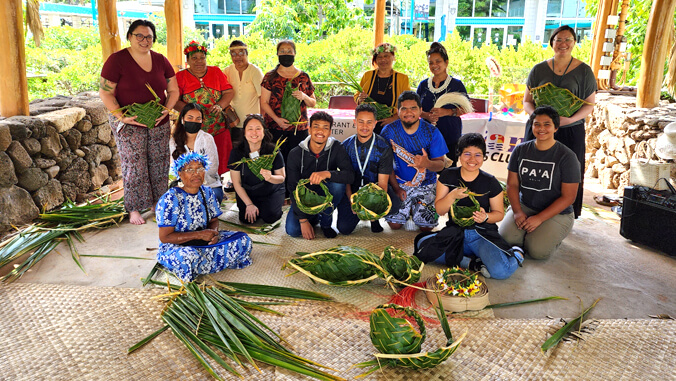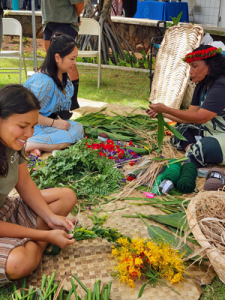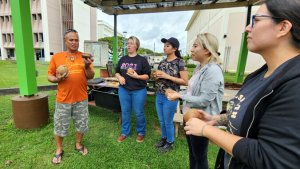
Nearly 250 people participated in Honolulu Community College’s Hoʻolauleʻa 2023, which was held April 17–20. The theme for this year’s celebration was Kanu ʻia Ka Huli, Ulu Ka ʻāina (planting seeds and cultivating the environment).
Ka Māla o Niuhelewai (the garden of Niuhelewai) started with the planting of more than 20 varieties of Hawaiian kalo (taro) in March 2011 with the support of the Office of Hawaiian Affairs and Honolulu CC. It is an on-campus venue of learning for students, staff and community groups to increase exposure and understanding of traditional Hawaiian ʻike (knowledge) such as subsistence farming in an urban community and sustainable stewardship.

Every April, when the kalo is ready to harvest, Honolulu CC celebrates the māla with an annual Hoʻolauleʻa. This year marks 11 years since the first kalo harvest from Ka Māla o Niuhelewai in April 2012.
“Hoʻolauleʻa also coincides with Earth Day celebrations and the māla promotes the organic practices of traditional Hawaiʻi,” said Alapaki Luke, Kūlana Hawaiʻi chair and Hawaiian Programs Division coordinator (Nā Papa Hawaiʻi). “Hoʻolauleʻa brings the campus together to participate in or learn about Hawaiian cultural activities along with other cultural/sustainability activities on campus and in the community.”
The Hoʻolauleʻa celebration featured lunch (kalua pig, sweet potato, kulolo) cooked in the imu (earthen oven), live entertainment, a plant seedling giveaway, lei making, a resource fair and Makahiki games. The free, four-day event also included numerous activities—hands-on sustainable workshops and seminars, informative sessions about native wildlife and a Trash 2 Treasure competition.

“Honolulu Community College’s annual Hoʻolauleʻa celebrates the harvest from Ka Māla o Niuhelewai which also honors the earlier traditional uses of this ʻāina that our campus is located within,” said Luke. “Niuhelewai stream used to flow within our campus boundaries and is now diverted up mauka to the Kapālama canal. In the Land Commission Awards (LCA), there were native tenants that maintained 45 loʻi (taro patches with water) recorded in the LCA. We have returned a small amount of food grown in this area to feed our campus every April and promote traditional and customary practices such as the imu (earthen oven) that cooks the food for Hoʻolauleʻa. Mahalo to the entire campus and the community partners for supporting Hoʻolauleʻa.”


